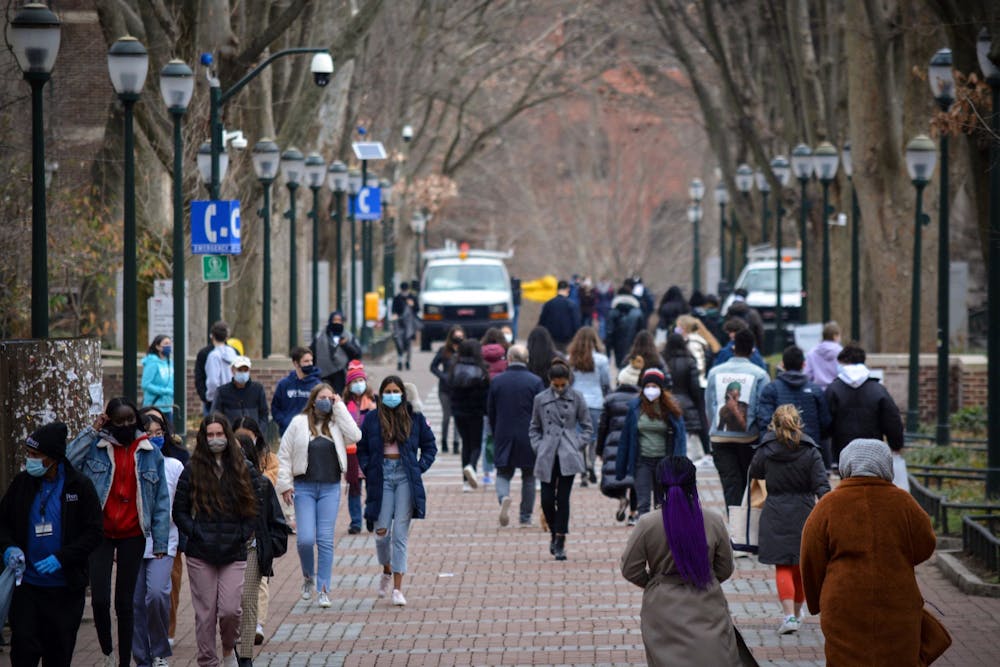
Last week, I received a significantly lengthier and more detailed email about the cold weather than I did about the alarmingly high COVID-19 positivity rates on campus. While Penn’s positive cases continued to skyrocket, the extent of communication from the university itself ended with an offhand message about Super Bowl parties. Rather than trying to intimidate its students with empty threats, Penn should take a long, hard look at its enforcement of its COVID-19 regulations — or lack thereof.
Though students undoubtedly have a responsibility to themselves and the community to remain safe and make smart decisions, the university cannot realistically expect their guidelines to be followed if they put little effort into sanctioning them. Students who are actively being safe will try to do so while those who did not take them seriously in the first place will not change their actions following a passive emergency alert. Penn’s COVID-19 policies need to do more than just pin the blame on students; by neglecting to address violations and implement protocols appropriately, Penn is putting its students, staff, and the greater Philadelphia community at risk.
Despite any genuine intentions, it’s becoming abundantly clear that many of the University's policies have been for show and nothing more. Even before arriving on campus, I had reservations about the success of Penn’s pod system — concerns which were quickly confirmed within the first hours of my arrival as I saw groups of 10 or more students eating together. After weeks of students on campus, there has still not been any clarification on how pods were intended to be divided and defined; thus, they have held virtually no meaning outside of Penn’s website and its emails to parents.
The Penn Open Pass system, though potentially effective in theory, has just become another chore of mindlessly checking off boxes as students rush out the door. For the most part, even with red passes, students are still able to leave and enter buildings or see other people as they please. It wasn’t until a few days ago that Penn even started prohibiting students with red passes from entering dining halls to pick up food. Still, there are no regulations or even recommendations for secondary contacts and the students that are encouraged to deliver meals for their friends in quarantine.
The stories being told through the grapevine, whether exaggerated or not, showcase just how superficial the Penn administration’s supposed procedures are. In one case, after getting caught at a large gathering in their dorm, the group of students were called in to see administration and asked to do nothing more than create an educational infographic on the virus. Within the same high rise dorm, some common areas remain locked while those on other floors are freely accessible without supervision. One Resident Advisor, who asked to remain anonymous for fear of retaliation, shared how students’ passes remained green for days despite being identified as a close contact. Even through policy enforcement by Resident Advisors and Graduate Assistants and staff, there is also a tremendous discrepancy in degree of regulation. There have been students getting reprimanded for standing in a group of three in the hallway, despite being masked and distanced, while just one floor above, fifteen students are gathered around a tiny table playing cards.
Perhaps the riskiest repercussion of Penn’s failure to stand behind its regulations is the lack of trust and respect the student community now has — a sentiment which will extend far beyond these next few months. Penn can only cry wolf for so long before students started to realize that their actions had little to no consequences. Unfortunately, that line was crossed weeks ago when anyone could look out onto Locust and realize the “Quiet Period” was a mere ornament that appeared to be more of a loose suggestion than a requirement. Speaking with peers at other universities, the biggest differences in our experiences don’t lie in the schools’ official policies, but rather the attitude students have about actually following them.
While we can all sit back and frown upon students who “should just know better,” it is neither realistic nor effective to hope students will eventually find the incentive to follow the university’s rules on their own. If Penn isn’t taking its own regulations as seriously as it should, how can it expect the student body to? The next time Penn administration decides to send out a querulous message about the COVID-19 cases that will inevitably continue to climb, they should recognize that the first ones they should be pointing fingers at are themselves.
VALERIE WANG is a Wharton first year studying management and business analytics from Bethesda, Md. Her email address is valwang@wharton.upenn.edu.
The Daily Pennsylvanian is an independent, student-run newspaper. Please consider making a donation to support the coverage that shapes the University. Your generosity ensures a future of strong journalism at Penn.
Donate







